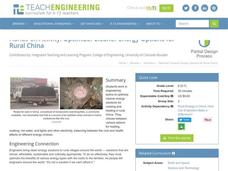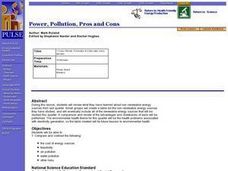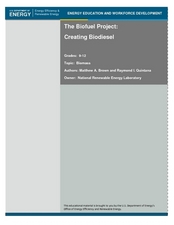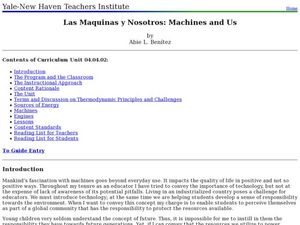Curated OER
Climate and Temperature
Learners explore what the soil temperature would be on the north and south sides of a building. In this temperature lesson, students hypothesize what the results will be using a thermometer and then after a week see what the temperatures...
Teach Engineering
Trash to Treasure!
One person's trash is another man's treasure. Challenge your class to build something useful out of the trash they throw away on a regular basis. Groups design and build a practical item from trash they collect, allowing the class to...
Teach Engineering
Concentrating on the Sun with PVs
Concentrate to determine the best reflector design. Pairs use the engineering design process to build a reflector to increase the current output of a photovotaic panel. Teams arrive at a final design and present it to the class along...
Teach Engineering
Optimize! Cleaner Energy Options for Rural China
What are the trade-offs when looking to get the most benefit from an energy source? Small groups compare the cost-to-emission levels of several energy sources by looking at the information graphically. The groups utilize this information...
Teach Engineering
Energy Conversions
What energy conversions occur in the operation of a device? Small groups investigate devices and the energy conversions that occur. The groups create energy flow diagrams with added conversion processes for each of the devices...
Teach Engineering
Ice, Ice, PV!
Knowing the temperature coefficient allows for the calculation of voltage output at any temperature. Groups conduct an experiment to determine the effects of temperature on the power output of a solar panel. The teams alter the...
Teach Engineering
Building a Piezoelectric Generator
In pairs, learners build a piezoelectric generator from readily available electric components in the second and final installment of the two-part series. Tapping the piezoelectric element produces enough electricity to light an LED....
Teach Engineering
Energy Intelligence Agency
Protect the world from energy depletion—join the Energy Intelligence Agency. Using a set of cards, pupils distinguish between correct and incorrect information regarding energy use in the United States. They analyze graphs and diagrams...
Teach Engineering
Edible Algae Models
Sometimes it's okay to eat your science experiment. A hands-on activity has pupils create models for algae to learn about its cellular structure. The best part of the experiment? The resulting juice-filled gels are edible—yum!
Curated OER
Power, Pollution, Pros and Cons
Students review what they know about non-renewable energy, compare and contrast advantages and drawbacks of each type, such as cost of energy sources, feasibility, air pollution, water pollution, and other risks, and create table listing...
Curated OER
Need vs. Wants in Creating Sustainable Communities
Ninth graders create a T chart of their needs and wants. In this environmental science lesson, 9th graders brainstorm ideas on how to create a sustainable community. They decide what they would give up and keep to make the community...
Curated OER
More Power to You
Students explore renewable and nonrenewable energy sources and develop a documentary that explores multiple energy sources and draws conclusions about their uses.
Curated OER
Wind Energy
Students explore wind energy by making a pinwheel to model a wind turbine. They experiment with their turbine by placing it in different locations for optimal energy.
Curated OER
The Bio-fuel Project: Creating Bio-diesel
Students investigate bio-fuel. In this investigative lesson, students create bio-fuel from vegetable oil waste. Students will analyze, predict, collect and synthesize data from their experiments with bio-fuel.
Curated OER
Water Power
Learners observe a model of a waterwheel to investigate the transformations of energy involved in turning the blades of a hydro-turbine into work. They work as engineers to create a model for a new waterwheel while considering resources,...
Curated OER
What Makes a Home "Energy Efficient"?
Students research and report the costs and benefits of making their own homes more energy efficient. In this energy conservation lesson, students explore energy efficient technologies and design over several days. They complete a home...
Curated OER
Amazing Grazing: Keeping Our Ecosystem Running
Students discover the value of sustainability within our ecosystem. In this ecological lesson, students discuss the importance of a food cycle in our society, and how humans can improve the conservation of a healthy ecosystem. Eventually...
Curated OER
Las Maquinas y Nosotros: Machines and Us
Second graders explain the relationship between energy and work. In this technology lesson, 2nd graders describe the different uses of machines in their everyday lives. They record observations and data in their science journal.
Curated OER
"Web of Life" Game
Students relate members of an ecosystem by their interactions. In this ecosystem lesson, students toss a ball to other members of their group (each representing a member of an ecosystem) and tell how they are related to that member....
Curated OER
Lights Light Up My Life
Students conduct an investigation. In this energy conservation lesson, students observe and make predictions about fluorescent and incandescent light bulbs. Working in groups, students conduct an investigation to compare the two light...
Curated OER
Hawaii's Freshwater Ecosystems
Students examine brackish water. In this Science lesson, students observe organisms found in brackish water. Students record their observations of the various organisms.
Curated OER
Energy Sources and Use
Students will use Internet resources to investigate and compare alternative sources of energy. It is presumed that students have some basic prior understanding of the concept of energy.
Curated OER
Sorting
Students examine the concept of organization. For this library skills lesson, students practice ordering and classification skills by playing the Flood Game as well as locating and shelving books in the school library.
Curated OER
Management of Commercial Fisheries
Young scholars examine the differences between renewable and nonrenewable resources and study about past fisheries. In this fishery lesson students explore the complexity of a fishery and its management.

























